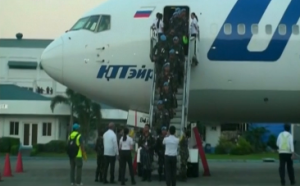
(Reuters) — More than 100 Philippine peacekeepers arrived at an airbase in Manila on Wednesday (November 12) after staying for almost a year in Liberia.
Family members were not allowed contact with the Filipino soldiers and had to watch their arrival in front of monitors set up inside the air force museum, which was around a kilometre away from the peacekeepers.
Social workers from the Health Department assisted in debriefing the families with a psycho-social session to help them understand the situation.
Cheche, a mother of five whose husband is a peacekeeper and has been a soldier for 15 years, understood the situation. She was happy to see him back despite knowing that she could only see him on screen.
“Whether he stays here or goes back, I’ll stand by him because I know when I married him that he is a soldier and I need to accept him for who he is. He told me he loves his country and his duty more than us and I respect his decision,” she said.
The troops are set to undergo a 21 day-quarantine at a navy-run island in Manila Bay as part of the government’s precautionary measures in line with World Health Organization protocols.
“We want to just be, as much as we can, make sure that there’s no doubt, there’s no doubt at all because even if they’re already cleared, we did our own quarantine, and then just for the sake of having confidence,” Philippine Air Force spokesperson Lt. Col. Enrico Canaya said.
The Philippine military clarified that the Filipino peacekeepers had passed medical screening conducted by the United Nations prior to their arrival in Manila.
They travelled by bus to a naval base south of Manila and were transported by ship to Caballo island, a naval facility used by the Americans during World War Two.
The Filipino peacekeepers’ return was part of an order issued by President Benigno Aquino in August to withdraw the troops from Liberia due to the Ebola outbreak.
The military earlier said the peacekeepers had no direct contact with any Ebola victims as their work was concentrated inside the headquarters of the United Nations mission in Liberia.
The death toll from the Ebola epidemic has risen to at least 5,160 in the three worst-hit countries of West Africa, Guinea, Liberia and Sierra Leone, according to the WHO, calling for widespread rigorous controls to halt its spread.
The U.N. peacekeeping force in Liberia was set up in 2003 to support a civil war ceasefire.
The Philippine Health Department has trained hundreds of medical workers and prepared at least 22 hospitals across the country to handle Ebola cases in case the disease reaches thePhilippines.







